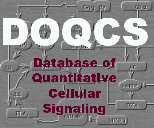
|
Enter a Search String | | Special character and space not allowed in the query term.
Search string should be at least 2 characters long. |
Molecule Parameter List for AA | The statistics table lists the distribution of a molecule acting either as a substrate, product, enzyme or as a molecule within the network.
The text color of a molecule is highlighted by  color. color. | | Statistics |
| AA participated as | Molecule | Sum total of | Enzyme | Substrate of an enzyme | Product of an enzyme | Substrate in Reaction | Product in Reaction | | No. of occurrences | 1 | 0 | 0 | 0 | 0 | 3 | 0 |
Accession and Pathway Details | |
| Accession Name | Accession No. | Accession Type | Pathway Link | | PKC_turnover | 26 | Pathway |
PKC | | This model is a superset of the PKC model presented in Bhalla US and Iyengar R. Science (1999) 283(5400):381-7. The current version includes PKC turnover. This version includes the stimulating pools Ca, AA and DAG as well as the PKC activity within the synaptic signaling pathway since it is meant to be a self-contained pathway model rather than part of a network. |
AA acting as a Molecule in PKC_turnover Network
| Name | Accession Name | Pathway Name | Initial Conc.
(uM) | Volume
(fL) | Buffered | | AA | PKC_turnover
Accession No. : 26 | PKC
Pathway No. : 138 | 5.5 | 1000 | No | | Arachidonic Acid. This messenger diffuses through membranes as well as cytosolically, has been suggested as a possible retrograde messenger at synapses. Based on simulations the AA settles to around 5.5 uM under resting conditions. |
AA acting as a Substrate in a reaction in PKC_turnover Network
| Kd is calculated only for second order reactions, like nA+nB <->nC or nA<->nC+nD, where n is number and A,B,C,D are molecules, where as for first order reactions Keq is calculated.
Kd for higher order reaction are not consider. |
| | Name | Accession Name | Pathway Name | Kf | Kb | Kd | tau | Reagents | | 1 | PKC-act-by-Ca-AA | PKC_turnover
Accession No. : 26 | PKC
Pathway No. : 138 | 0.0012
(uM^-1 s^-1) | 0.1
(s^-1) | Kd(bf) = 83.3333(uM) | - | Substrate
AA
PKC-Ca
Product
PKC-Ca-AA*
| | | Ca-dependent AA activation of PKC. Note that this step combines the AA activation and also the membrane translocation. From Schaechter and Benowitz 1993 J Neurosci 13(10):4361 | | 2 | PKC-act-by-AA | PKC_turnover
Accession No. : 26 | PKC
Pathway No. : 138 | 0.0001
(uM^-1 s^-1) | 0.1
(s^-1) | Kd(bf) = 833.3333(uM) | - | Substrate
AA
PKC-cytosolic
Product
PKC-AA*
| | | AA stimulates PKC activity even at rather low Ca. Schaechter and Benowitz 1993 J Neurosci 13(10):4361 Note that this one reaction combines the initial interaction and also membrane translocation. | | 3 | PKC-n-DAG-AA | PKC_turnover
Accession No. : 26 | PKC
Pathway No. : 138 | 0.018
(uM^-1 s^-1) | 2
(s^-1) | Kd(bf) = 111.1111(uM) | - | Substrate
AA
PKC-DAG
Product
PKC-DAG-AA
| | | This is one of the more interesting steps. Mechanisticmpdmyy it does not seem necessary at first glance. Turns out that one needs this step to quantitatively match the curves in Schaechter and Benowitz 1993 J Neurosci 13(10):4361 and Shinomura et al 1991 PNAS 88:5149-5153. There is a synergy between DAG and AA activation even at low Ca levels, which is most simply represented by this reaction. Tau is assumed to be fast. Kd comes from matching the experimental curves. |
| Database compilation and code copyright (C) 2022, Upinder S. Bhalla and NCBS/TIFR
This Copyright is applied to ensure that the contents of this database remain freely available. Please see FAQ for details. |
|
